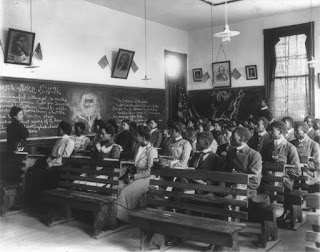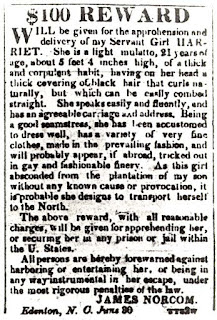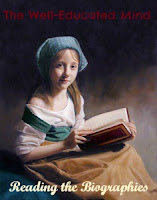“I was born a slave on a plantation in Franklin County, Virginia.”
This was my third book on slavery in succession that I’ve read for my WEM Project. The Incidents in the Life of a Slave Girl and the Narrative of the Life and Times of Frederick Douglass were the first two, and while I enjoyed the history and information I gleaned on a subject of which I know little (I plead ignorance on the basis of being Canadian), I really did not feel touched by either book as a whole. Really, I wondered if there was something wrong with me. Yes, I felt sympathy for the plight of the slaves; just the thought of being owned and having stripped from you the many things that make one human, was horrifying. The degradation and the suffering generated disgust. Yet there was something missing, for me at least.
In my Frederick Douglass review, Cirtnecce made a comment, and suddenly my mind opened up and I had it; the reason why I was left rather cold by the other two books. This was my response to her:
“What I’ve missed from these books so far, is a way to move forward in a human way. You can speak about practicalities and reason and that’s useful, but if one tries simply to protect one segment of the population or to legislate people’s behaviour, it almost seems as if nothing has truly changed. I’d love to read something that communicates ideas of how to make changes in the hearts and minds of people; imo, that’s the way to effect true change.”
That was it! I was looking for a book that would precipitate a transformation, and in Booker T. Washington’s biography, I received more than I could ever hope for!
Washington briefly chronicled his experiences as a slave during the Civil War, where he gained his freedom through emancipation at the approximate age of ten. Eventually he made his way to the Hampton Institute, earned an education through hard work, and because of his perserverance and a solid work ethic, Washington was chosen to become the first leading teacher of the Tuskegee Institute in Alabama, a school formed to promote the higher education of blacks in Confederate States. Washington’s biography offers an in-depth history of his creation and formation of Tuskegee, which Washington built not only with his hands, but his rather creative mind and intellect.
This book is a fascinating portrait of not only a man who rose above slavery, but conquered the demons that it bred, to see a way forward for blacks and whites to live, not just in harmony, but in cooperation with each other to make a better community and a better world. In spite of the racial prejudices he encountered, Washington never responded in anger, preferring to examine the issues and problems that caused the prejudice, and to respond in a way that was beneficial for both blacks and whites. He never viewed himself as a victim and in his gracious and measured responses, won accolades and respect on each side of the divide, narrowing it with his quiet, yet determined, demeanour.
There are so many wonderful quotes in this book that I hardly know where to start. I’m going to choose to concentrate mostly on the Tuskegee school, since it was such a large part of Washington’s life and therefore his existence, and it really exemplified his philosophy for social change in a manner that was visual and effective.
 |
| Tuskegee Univeristy Panorama (1916) source Wikipedia |
Washington structured the Tuskegee school not only to promote learning but to entrench something possibly even more valuable …… hard work. The students were given preference, not only because of their academic abilities, but their willingness to work hard.
“No student no matter how much money he may be able to command, is permitted to go through school without doing manual labour ……. From the beginning, at Tuskegee, I was determined to have the students do not only the agricultural and domestic work, but to have them erect their own buildings. My plan was to have them, while performing this service, taught the latest and best methods of labour, so that the school would not only get the benefit of their efforts, but the students themselves would be taught to see, not only utility in labour, but beauty and dignity; would be taught, in fact, how to lift labour up from mere drudgery and toil, and would learn to love work for its own sake. My plan was not to teach them to work in the old way, bt to show them how to make the forces of nature —– air, water, steam, electricity, horse-power —- assist them in their labour ………… Mistakes I knew would be made, but these mistakes would teach us valuable lessons for the future.”
 |
| The Oaks – Washington’s home on Tuskegee campus source Wikipedia |
However, while work and academia were important, Washington did not neglect the spiritual growth of his students including services and prayer, using a non-denominational model. I know little about the times in this respect, but I can imagine that this was a revolutionary way of structuring an academic institution:
“If no other consideration had convinced me of the value of the Christian life, the Christlike work which the Church of all denominations in America has done during the last thirty-five years for the elevation of the black man would have made me a Christian. In a large degree it has been the pennies, the nickles, and the dimes which have come from the Sunday-schools, the Christian Endeavour societies, and the missionary societies, as well as from the church proper that have helped to elevate the negro at so rapid a rate.”
And paramount to anything, Washington exemplifies forgiveness:
“It is now long ago that I learned this lesson from General Armstrong, and resolved that I would permit no man, no matter what is colour might be, to narrow and degrade my soul by making me hate him. With God’s help, I believe that I have completely rid myself of any ill feeling toward the Southern white man for any wrong that me hay have inflicted upon my race. I am made to feel just as happy now when I am rendering service to Southern white men as when the service is rendered to a member of my own race. I pity from the bottom of my heart any individual who is so unfortunate as to get into the habit of holding race prejudice.”
“I early learned that it is a hard matter to convert an individual by abusing him, and that this is more often accomplished by giving credit for all the praiseworthy actions performed than by calling attention alone to all the evil done.”
 |
| History class at Tuskegee Institute 1902 source Wikipedia |
Washington rather fell into public speaking, feeling that it was more important “to do things than merely to talk about doing them.” He first went north with his friend and mentor, General Armstrong, a white educator dedicated to the education of blacks and a founder of the Hampton Institute, and spoke at a series of public meetings. In 1895, Washington was asked to speak at the Atlanta Exposition, an important exposition to showcase products and new technologies. His speech was received with accolades from both whites and blacks alike, and afterwards, Washington became a highly sought after speaker about the benefits raising black ingenuity, hard work and resourcefulness to the level of white America. He promoted the improvement of race relations where blacks and whites both stood on level ground. There is a fascinating section of the book where Washington expounds on his manner of public speaking and it includes some gems of advice:
” ……. It seems to me that there is rarely such a combination of mental and physical delight in any effort as that which comes to a public speaker when he feels that he has a great audience completely within his control. There is a thread of sympathy and oneness that connects a public speaker with his audience, that is just as strong as though it was something tangible and visible …… I never tell an anecdote simply for the sake to telling one …… I believe that one always does himself and his audience an injustice when he speaks merely for the sake of speaking. I do not believe that one should speak unless, deep down in his heart, he feels convinced that he has a message to deliver …..”
At the close of the book, Washington first gives a schedule for his Tuskegee school which is rather interesting from the view of posterity:
And his teaching philosophy, while appearing relatively simple, is designed to have far-reaching results. Washington strove to empower his students, not only academically, but to give them skills to serve them well in life.
“In our industrial teaching we keep three things in mind: first, that the student shall be so educated that he shall be enabled to meet conditions as they exist now, in the part of the South where he lives —– in a word, to be able to do the thing which the world wants done; second, that every student who graduates from the school shall have enough skill, coupled with intelligence and moral character, to enable him to make a living for himself and others; third, to send every graduate out feeling and knowing that labour is dignified and beautiful —- to make each one love labour instead of trying to escape it.”
During this time, the Tuskegee school had so many applicants that they were forced to turn away half and could only supply one half of the graduates that were requested. A huge accomplishment from twenty years ago when Washington started the school from sweat, common sense, an empathy for all people, and a firm belief in industry.
A final quote by Washington which I think encompasses much of his philosophy:
“Before the end of the year, I think I began to learn that those who are happiest are those who do the most for others. This lesson I have tried to carry with me ever since.”








